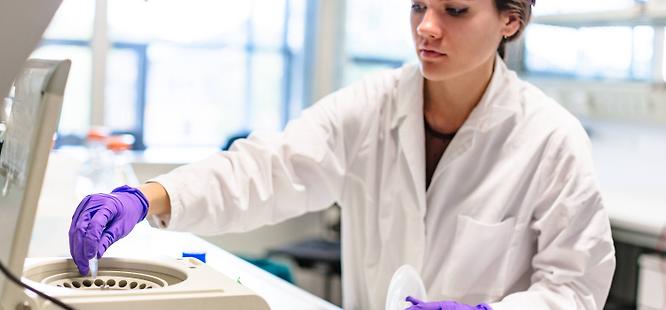
Three Common Lab Tests at Urgent Care
Oct 28, 2021 | Urgent Care | Share:
Why do doctors order lab tests?
When you’re visiting an urgent care clinic, your doctor might order some lab tests to diagnose what’s making you feel unwell. Your doctor will always listen carefully to your symptoms and perform a thorough physical exam, but sometimes the physical exam won’t provide enough information for your doctor to diagnose you or provide proper treatment.
You don’t want your doctor to guess at what’s making you sick. Lab tests can help your urgent care doctor pinpoint what’s wrong by helping them see what’s going on inside your body. Once they have the lab results in, they’re able to give you a more accurate diagnosis.
Common labs at urgent care clinics
Depending on your symptoms, there are a number of tests your urgent care doctor might order. But the three most common lab tests used in an urgent care clinic are complete blood count (CBC), urinalysis, and antigen testing.
Complete Blood Count (CBC)
The Complete Blood Count, also known as a CBC, is one of the most common tests your doctor might order. The CBC is usually performed by taking a sample of blood from a vein in your arm. This test is used to look at the different components of your blood, including red blood cells, white blood cells, and platelets.
When you’re sick, doctors are often most interested in your white blood count. Certain types of white blood cells will increase to fight different types of infections. If you come to an urgent care clinic with cold symptoms (and your Covid test is negative), your doctor may order a CBC to determine if your symptoms are due to a bacterial infection, a virus, or even allergies. Once your doctor knows the cause of your symptoms, they can provide targeted treatment that can help you feel better.
The other information in your CBC is also really valuable to your doctor. Your doctor can also see the size, concentration, and volume of your red blood cells, as well as the percentage of your blood that is composed of red blood cells (hematocrit). Abnormal RBC results can indicate other common problems such as anemia or B12 deficiency.
Urinalysis
If your doctor orders a urinalysis, there’s no need to be embarrassed. A urinalysis is a lab test that analyzes the components of your urine. For a urinalysis, you’ll usually be asked to urinate in a small cup in a private bathroom within the doctor’s office.
Although urine is usually flushed away, it actually provides a lot of information about what’s going on in your body. When your urine is examined by the lab, the technician is looking at a number of things:
- Appearance: Your urine should be clear and pale yellow in color. Abnormal urine may appear cloudy or foamy, have an unusual odor, or have visible blood present.
- Composition: Your lab will use a dipstick to analyze the acidity (pH) of your urine. They will also look for the presence of proteins, sugar, ketones, blood, and leukocytes.
- Microscopic Particles: Here, your lab is looking for what cannot be seen in other tests. The lab will use a microscope to examine a highly concentrated specimen of your urine for red blood cells, white blood cells, bacteria, and crystals.
Your doctor might order a urinalysis if you have a fever with no other symptoms, have pain or difficulty urinating, or report other symptoms consistent with a urinary tract infection. Abnormal urinalysis results can indicate the presence of urinary tract infection or kidney stones. Urinalysis can also be used as a screening or monitoring tool for people who have diabetes. Some abnormal urinalysis results may demonstrate a need for further testing.
Antigen tests
If you’ve ever had a rapid test for Covid-19, you’ve had experience with antigen tests. Antigen tests provide rapid diagnostic results for Covid-19, flu, and strep. These tests detect specific antigens (a substance your body will make antibodies for) for these illnesses. These antigens are unique for each illness.
All antigen testing is performed by swabbing the affected area for a mucus sample. Flu and Covid-19 tests utilize a nasal swab while a rapid strep test uses a throat swab. This sample is then analyzed in the lab, and results for antigen tests are usually available in about fifteen minutes.
Antigen tests are very specific, which means a Covid-19 test will only test for Covid-19 antigens and a flu test will only test for flu antigens. You won’t accidentally get a positive Covid test if you actually have the flu. In fact, antigen tests will rarely produce a false positive.
However, these tests will occasionally produce a false negative, which is why confirmatory testing is often performed. If you’ve ever had a doctor say, “Your rapid strep test was negative, but we’re also going to do a culture on your sample,” they’re letting you know that they’re doing further testing to confirm the results from your antigen test.
There’s no need for concern if your urgent care doctor orders some lab work when you’re sick. Laboratory testing is a valuable diagnostic tool that can help your doctor give you the best treatment possible so that you can get better soon.
At MedHelp urgent care clinics, we have CLIA-certified labs onsite to read your results quickly and accurately.
MedHelp urgent care clinics are here for you. We’re open seven days a week with extended weekday hours to fit your schedule.